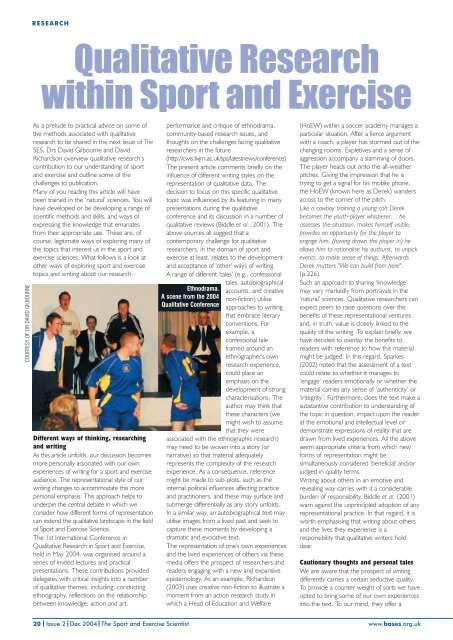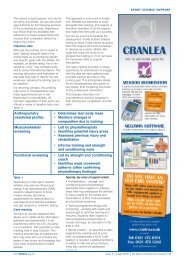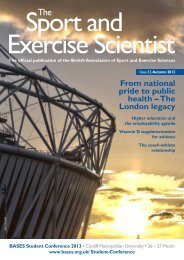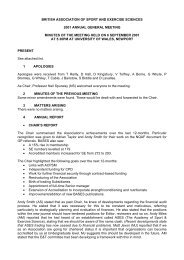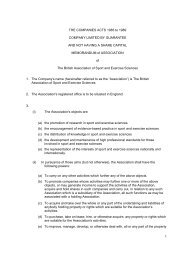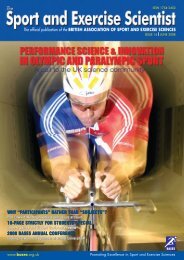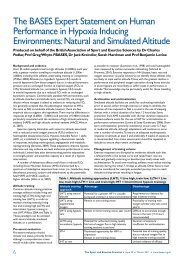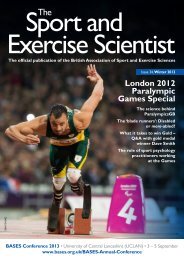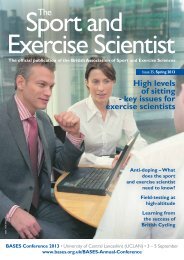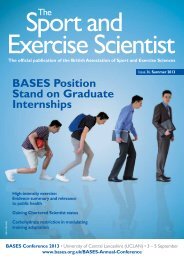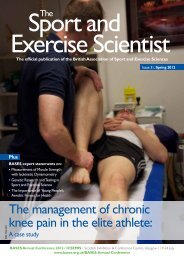RESEARCHQualitative Researchwithin Sport and ExerciseCOURTESY OF DR DAVID GILBOURNEAs a prelude to practical advice on some ofthe methods associated with qualitativeresearch to be shared in the next issue of TheSES, Drs David Gilbourne and DavidRichardson overview qualitative research’scontribution to our understanding of sportand exercise and outline some of thechallenges to publication.Many of you reading this article will havebeen trained in the ‘natural’ sciences. You willhave developed or be developing a range ofscientific methods and skills, and ways ofexpressing the knowledge that emanatesfrom their appropriate use. These are, ofcourse, legitimate ways of exploring many ofthe topics that interest us in the sport andexercise sciences. What follows is a look atother ways of exploring sport and exercisetopics and writing about our research.Different ways of thinking, researchingand writingAs this article unfolds, our discussion becomesmore personally associated with our ownexperiences of writing for a sport and exerciseaudience. The representational style of ourwriting changes to accommodate this morepersonal emphasis. This approach helps tounderpin the central debate in which weconsider how different forms of representationcan extend the qualitative landscape in the fieldof Sport and Exercise Science.The 1st International Conference inQualitative Research in Sport and Exercise,held in May 2004, was organised around aseries of invited lectures and practicalpresentations. These contributions provideddelegates with critical insights into a numberof qualitative themes, including: conductingethnography, reflections on the relationshipbetween knowledge, action and art,performance and critique of ethnodrama,community-based research issues, andthoughts on the challenges facing qualitativeresearchers in the future(http://cwis.livjm.ac.uk/sps/latestnews/conference)The present article comments briefly on theinfluence of different writing styles on therepresentation of qualitative data. Thedecision to focus on this specific qualitativetopic was influenced by its featuring in manypresentations during the qualitativeconference and its discussion in a number ofqualitative reviews (Biddle et al., 2001). Theabove sources all suggest that acontemporary challenge for qualitativeresearchers, in the domain of sport andexercise at least, relates to the developmentand acceptance of 'other' ways of writing.A range of different ‘tales’ (e.g., confessionalEthnodrama.A scene from the 2004Qualitative Conferencetales, autobiographicalaccounts, and creativenon-fiction) utiliseapproaches to writingthat embrace literaryconventions. Forexample, aconfessional taleframed around anethnographer's ownresearch experience,could place anemphasis on thedevelopment of strongcharacterisations. Theauthor may think thatthese characters (wemight wish to assumethat they wereassociated with the ethnographic research)may need to be woven into a story (ornarrative) so that material adequatelyrepresents the complexity of the researchexperience. As a consequence, referencemight be made to sub-plots, such as theinternal political influences affecting practiceand practitioners, and these may surface andsubmerge differentially as any story unfolds.In a similar way, an autobiographical text mayutilise images from a lived past and seek tocapture these moments by developing adramatic and evocative text.The representation of one's own experiencesand the lived experiences of others via thesemedia offers the prospect of researchers andreaders engaging with a new and expansiveepistemology. As an example, Richardson(2003) uses creative non-fiction to illustrate amoment from an action research study inwhich a Head of Education and Welfare(HoEW) within a soccer academy manages aparticular situation. After a fierce argumentwith a coach, a player has stormed out of thechanging rooms. Expletives and a sense ofaggression accompany a slamming of doors.The player heads out onto the all-weatherpitches. Giving the impression that he istrying to get a signal for his mobile phone,the HoEW (known here as Derek) wandersacross to the corner of the pitch.Like a cowboy training a young colt Derekbecomes the youth-player whisperer… heassesses the situation, makes himself visible,provides an opportunity for the player toengage him, (having drawn the player in) heallows him to rationalise his outburst, to unpickevents, to make sense of things. AfterwardsDerek mutters "We can build from here".(p.226).Such an approach to sharing ‘knowledge’may vary markedly from portrayals in the‘natural’ sciences. Qualitative researchers canexpect peers to raise questions over thebenefits of these representational venturesand, in truth, value is closely linked to thequality of the writing. To explain briefly, wehave decided to overlay the benefits toreaders with reference to how this materialmight be judged. In this regard, Sparkes(2002) noted that the assessment of a textcould relate to whether it manages to‘engage’ readers emotionally or whether thematerial carries any sense of ‘authenticity’ or‘integrity’. Furthermore, does the text make asubstantive contribution to understanding ofthe topic in question, impact upon the readerat the emotional and intellectual level ordemonstrate expressions of reality that aredrawn from lived experiences. All the aboveseem appropriate criteria from which newforms of representation might besimultaneously considered 'beneficial' and/orjudged in quality terms.Writing about others in an emotive andrevealing way carries with it a considerableburden of responsibility. Biddle et al. (2001)warn against the unprincipled adoption of anyrepresentational practice. In that regard, it isworth emphasising that writing about othersand the lives they experience is aresponsibility that qualitative writers holddear.Cautionary thoughts and personal talesWe are aware that the prospect of writingdifferently carries a certain seductive quality.To provide a counter weight of sorts we haveopted to bring some of our own experiencesinto the text. To our mind, they offer a20<strong>Issue</strong> 2 Dec 2004 The Sport and Exercise Scientistwww.bases.org.uk
RESEARCHglimpse of the editorial tensions associatedwith alternative representation.With Research Assessment Exercise (RAE)pressures ever present, those qualitativeresearchers who commit to the more creativequalitative writing process can presently expectto become engaged in a frustrating and highriskstrategy. Whilst times are changing, gainingreviewer approval for more creative texts canstill be a testing process.When qualitative inquiry is representedthrough the deployment of one or more ofthe creative genres, authors can expect toengage with a protracted review process.The regularity with which the process ofcritique, counter response and explanation,has been rehearsed by the present authors,suggests (to us at least) that qualitativeresearchers in the sport and exercise sciencescommunity do not presently generate acritical mass of creatively oriented texts. Thesuccess will hopefully begin to redress thebalance. These events, by the fact they drawpeople together to share ideas and criticallyreflect, have the potential to empower morequalitative researchers to write about theirown experiences (and the experiences ofothers) in different ways. A chain of eventsmight then unfold. If there is expansion in thenumber of papers that explore more creativerepresentation styles, then the level ofepistemological debate within the sport andexercise community should also increase.The impact of these two events could be farreaching. For example, critical exchangemight facilitate the development of peerreview protocols so that they align coherentlywith a number of writing styles. Thesedevelopments will also help to secure thequality of published material, and furtherextend the publication opportunities for thequalitative researchers across the sport andexercise sciences.In conclusionThe present article has discussed a numberof writing approaches and touched uponwriting conventions that seek to engage thereader emotionally through use ofcharacterisation, evocative imagery and soon. The remaining examples may serve toillustrate the virtues of these writing stylesand, in so doing, may attract someresearchers to them. However, theaccompanying background text may illustratesome of the challenges associated withattempts to get them published.A half-hearted fight breaks out on the pitch.Martin, the sport psychologist, leans forward asthe referee pulls out a red card. I watch theunfolding scene "Bit harsh that" Martin ignoresme and mutters "Get to him". Feeling rebuked Ifollow his gaze and focus on the guilty player.Standing, head bowed, hands on hips, heseems confused, exposed, suspended in anunfamiliar red card world. The partisan crowdhurl abuse at the referee, the noise climbs to adistracting pitch. None of the coaches go tomeet him, focusing instead on reorganisingtactics. "Someone get to him", there is moreurgency in Martin's voice now. I look on indespair as the boy breaks down. Under publicand peer gaze he sobs and stumbles for 50metres, past both sets of coaches andeventually (thankfully) he heads down thetunnel. His day ends in tears. I look across atMartin and sense he has walked every stepwith the boy…"Someone should have got tohim…he's just a kid."Gilbourne and Richardson (in review).Writing in such a way might sound exciting tosome and unconvincing to others but, to adegree, polarity of opinion is to be expected.A final creative non-fiction vignette taken froman autobiographical paper (Gilbourne, 2002)ends the present discussion. Hopefully,several strands of the above debate can bejoined-up as a result of the vignettes' inclusion.By way of background, I (first author) waskeen for the paper to be available to a SportsPsychology audience. The paper dealt withsport injury and the lifelong consequences ofthe experience. In this tale, family and sportbasedrelationships feature quite prominently.Despite several attempts to pacify reviewerswithin the domain of Sport Psychology (an 18month process), the received editorialwisdom was that 'the community' (that's you)was 'not ready'!The following passage revisits a consultationin which I meet a distressed athlete. Theathlete had requested the meeting to discusssports injury issues. The consultationmotivated me to write the paper. I had beenshocked by the client’s persona and wastroubled by his story for months after.He spoke about his career ending. The tale wastragic…big contract waiting…everythingagreed, the move of dreams…one last gamefor his old team (a favour for the manager),one tackle ends everything…he never playsagain. Now he finds it difficult to work, longperiods of depression devastate his own and hisfamily’s yearly cycle. I watched his hands as hespoke, gripped together, they were constantlymoving, shaking. His eyes looked tired, devoidof any joy. He told his tale and I listened,impassive. By the end he appeared a beatenman, as if the re-telling had eaten a little moreof him away. We spoke for a while longer andour meeting came to a close. I walked with himto the door and watched him make his way toa waiting car…his elderly father had driven himto our meeting and would now, sharing his grief,take him home. I gathered my things togetherand made my way to my own car…a colleaguewas walking in my direction and inquired about'what I'd been up to'. I explained that I hadmet someone to discuss a sports injury. Mycolleague asked if he would play again, Iexplained his career ended almost 20 yearsago. (p. 73)As I drove home from the consultation, theemotionality of the affair reminded me thatmy own sporting career finished throughinjury. By coincidence, I had also stoppedplaying football 20 years ago. For a variety ofreasons I could not continue to tell theclient’s story, so I opted to tell mine. In doingso I began to wonder how many people, inthe daily routine of living a different life, maystill wrestle with the consequences of acareer ending injury, whilst those nearest tothem presume that they have 'moved-on'. Increating a rationale along the above lines, Iengaged in a writing process for reasons that'sit outside' those typically presented withinthe experimental arena.Attempts to publish the above venture withinthe sport and exercise arena were eventuallyabandoned in 2001. We occasionally muse overthose editorial sentiments from 2001 - 'notready yet'. The use of 'yet' suggests the time willcome. If readiness itself reflects a community'ssense of engagement, epistemological maturity,and self-confidence, then maybe that timeshould be upon us soon. ■ReferencesBiddle, S.J.H., Markland, D., Gilbourne, D.,Chatzisrantis, N.L.D. & Sparkes, A.C. (2001).Research methods in sport and exercise psychology:Quantitative and qualitative issues. Journal of SportSciences, 19, 777-809.Gilbourne, D. (2002). Sports participation, sportsinjury and altered images of self: An autobiographicalnarrative of a life long legacy. Reflective Practice, 3,71-88.Richardson, D. (2003). An exploration of the role ofHeads of Education and Welfare within the footballAssociation Premier League Academy Structure: AnAction Research Approach to Understanding RoleEvolvement and Practice. Doctoral Dissertation.Liverpool John Moores University.Sparkes, A.C. (2002). Telling tales in sport andphysical activity. Champaign IL: Human Kinetics.Dr David Gilbourne & Dr David RichardsonDavid is a principallecturer in qualitativeresearch methods andsport psychology in theSchool of Sport andExercise Sciences LiverpoolJohn Moores University.David has engaged in arange of qualitativemethodologies and explored a number of postmodernrepresentational styles.David David is a principallecturer in sport socialsciences and (acting)Assistant Director of theSchool of Sport and ExerciseSciences at Liverpool JohnMoores University. Dave'sresearch interest in elitefootball engages longitudinal action research,role evolvement and working practices of the'Academy Head of Education and Welfare'.www.bases.org.uk<strong>Issue</strong> 2 Dec 2004 The Sport and Exercise Scientist21


